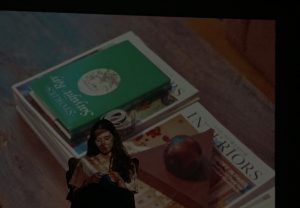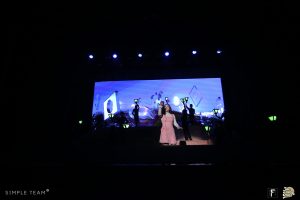 When Minh Hà Millie Lê ’24 was young, she imagined a career as a difference-maker.
When Minh Hà Millie Lê ’24 was young, she imagined a career as a difference-maker.
A Vietnamese third-culture kid, Lê has always been curious about people. She participated in student government and served as student body president, volunteered, and was part of Model United Nations, hoping to one day serve on the United Nations (UN) Human Rights Council.
By the time high school ended, however, she learned that UN resolutions take a long time to pass. “There are people better suited for that environment. They’re patient enough to work through resolution after resolution,” says Lê. “But it wasn’t for me. I felt more of an urgency in reaching people.”
Because she wanted to see change happen faster, she reflected on other ways to fulfill this mission—and she found it in the arts.
An artmaker by nature—with music, filmmaking and creative writing in her background—Lê has long intertwined art into her extracurriculars. “I realized the arts could be a faster way to start conversations and enact change.” At 17 years old, she co-founded a non-profit theatre company in Vietnam called FRAGMENTS, with Google and YouTube acting as her teachers. Lê wrote the script, her co-founder wrote the music, and together they produced an original musical with 63 Vietnam–based high school and university students.
“We were just kids trying to make theatre for the first time,” she explains. “In our education system, we didn’t have an arts program, so this was our artistic escape. It was amazing to see the stories we shared and the people we became at the end of that production, on and off the stage.” As of 2024, FRAGMENTS has produced two original musicals and expanded into the wider artistic community with a podcast, workshops, and digital content.
An Indirect Route to Studying Film and Theatre
With college around the corner, Lê was trying to decide what to study: the social sciences or the arts. She compromised with a major in communication studies at Loyola University Chicago.
Often mistaken for a film and/or theatre major, spending extensive time in both departments, it was there that she discovered her love for directing. Eventually landing on a theatre minor, Lê worked on both main stage and independent student productions in various roles. “The work of a director is multidisciplinary, which allows me to best facilitate conversations and then bring those conversations to life,” she explains. It is this kind of human connection that Lê holds at the center of her work.
After graduation, she spent a year working in theatre and publishing. During this time, she recognized some of the injustices she wanted to change at a global level, happening within the arts specifically.
“Artists aren’t getting paid well and are sometimes ignored in business conversations,” she says. “They’re looked at as if they don’t speak the same language as people in business. Especially once I started working as a freelance artist myself, it frustrated me and re-ignited my flame. I want to help artists get the respect they deserve and be able to choose art as a viable career.”

“Does It Feel Like Home”: a theatrical workshop exploring different definitions of home led by Minh Hà Millie Lê
Speaking Up to Bridge Communication Gaps
While Lê hadn’t considered graduate school before, this experience changed her mind. When she discovered the MS in Leadership for Creative Enterprises (MSLCE) program, she knew it would build the skills and capabilities she needed to speak up and bridge the gap between business and the creative arts. It would also help her build a stronger theatre company in Vietnam.
“I wanted to learn about law, negotiation, marketing, forecasting, economics, budgets, and contracts without having seven Google tabs open at the same time,” she explains. “I wanted to sit in business meetings as an artist and be part of important conversations.”
Classes like Associate Professor Larissa Buchholz’s Cultural Nonprofit Organizations is helping Lê Learn how to run an organization effectively, covering topics that range from board governance and programming to a live consulting case.
Meanwhile, Assistant Professor TJ Billard’s Brand Management in the Digital Age course is helping her refine her career path. “I realized I had preconceived notions about what branding and marketing were, even towards my own marketing practices,” says Lê. “That’s been an eyeopener, helping me realize what brand management actually is—and how I could use it as another way to help humans accomplish their goals and tell their stories in authentic, productive ways.”
Hands-On Opportunities Outside the Classroom
When she isn’t studying or in class, Lê works for Northwestern’s School of Communication as the MSLCE social media assistant. She hoped it would serve as another path to help her amplify voices within the arts community.
One of her first tasks was to design the branding for the MSLCE 10-year anniversary celebration. “It felt so empowering and was such an honor to be trusted with such a big project. I cultivated 10 years’ worth of stories from our diverse and inspiring cohorts into a visual identity.”
On a part-time basis, she manages the program’s social media content, sharing stories that happen inside and outside the classroom, offering a glimpse into the great work being done by MSLCE students. She’s also the mastermind behind the digital expansion of the program’s storytelling, taking it beyond the written word to include imagery and video content.
Lê is also currently interning for Wirtz Center Chicago, which hosts, produces, and presents work by local, national, and student artists.
With an internship in development and programming, she creates grant proposals, identifies new strategic-partnership opportunities, and supports the development of the Wirtz Center’s organizational structure and direction.
“We’re producing the work of Northwestern’s MFA students and creating a bridge for them to partner with industry professionals,” Lê explains. “In this role, I not only get to work in the Chicago theatre scene but also support the students who are going to be the future leaders of our theatre community.”
The hands-on skills she’s gaining are preparing her for a career in creative direction and to continue growing her theatre company after graduation.
“I want to work in the creative arts in the United States, but I also want to support artists back home in Vietnam,” she explains. “My dream is to do both, and MSLCE is helping make that a reality. I will be ready to support artists while being able to make art myself—carving out time to write or capture stories with my film camera.”
Millie Le’s 4 Tips for Future MSLCE Students
We asked Lê to share her best advice for achieving success as an MSLCE graduate student. Here’s what she had to say:
- Take that class you’re afraid of. “You’re already in grad school, so you might as well take the leap. You’ll likely discover that you’ll enjoy the topic more than you thought—and you’ll learn a lot.”
- Take advantage of opportunities—but say no when you need to. “It’s okay to take a break. Go for a walk before you feel like you need to go for a walk. Graduate school is like a full-time job, and many of us are also working a full- or part-time job. It can be a lot to balance, so take care of yourself.”
- Be a sponge. “You may think you know what you want to do and where you want to focus but be open to what comes your way. Be open to talking to new people. Attend seminars that cover topics you don’t know much about.”
- Call your family and friends. “Stay in touch with your support circle. My friends and I are even entertaining the idea of doing bimonthly PowerPoint discussions to catch up with each other on life.”
Read more on our blog and follow Northwestern’s MS in Leadership for Creative Enterprises program on Facebook, Instagram and Linkedin.

